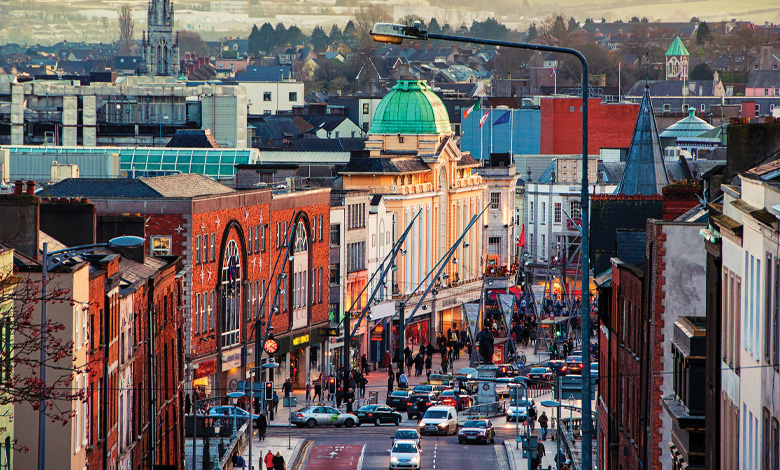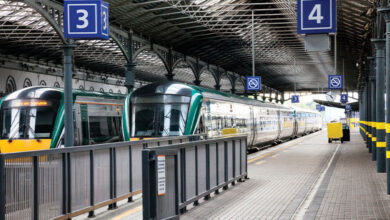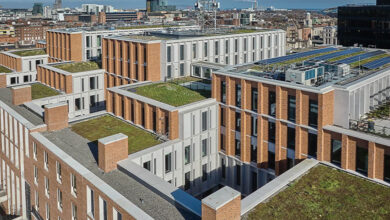What the NDP Review means for the future of Ireland’s cities

The 2025 Review of the National Development Plan has allocated €275.4 billion for new infrastructure projects throughout Ireland between 2026 and 2035. eolas Magazine examines the ramifications of this for the future of Ireland’s cities.
Housing
The 2025 review of the National Development Plan (NDP) reaffirms housing as the cornerstone of urban development. The Government’s ambition to deliver around 300,000 new homes by 2030 is supported by €35.9 billion in allocations for housing, including €7.7 billion for water infrastructure to unlock capacity for growth.
To accelerate delivery, the plan mandates the use of standardised designs for social housing and encourages modern methods of construction (MMC). These innovations aim to lower costs and speed up delivery, particularly in urban areas where demand is highest. The adoption of MMC is forecast to reduce labour shortages in the construction sector and support the delivery of an annual average of 12,000 social homes and 15,000 starter homes.
The NDP also integrates housing development with other urban priorities, including energy, transport, and climate resilience, aiming to ensure that new communities are well served by modern infrastructure.
Transport
The NDP commits €22.3 billion to the transport sector between 2026 and 2030, placing low-carbon mobility at the centre of future urban growth. Investment in public transport, active travel, and strategic projects like MetroLink will enhance connectivity, reduce congestion, and cut emissions.
MetroLink, backed by the Infrastructure, Climate and Nature Fund (ICNF), is the flagship project of this investment cycle. Its construction is to be accompanied by continued development of walking and cycling infrastructure, including 660km of new pathways and 400km of cycling routes.
Public consultation for the review confirmed transport as the top priority for additional investment, with 77 per cent of respondents highlighting its importance. This aligns with the National Planning Framework (NPF), which promotes compact, sustainable urban development supported by integrated transport networks.
Energy and water
The NDP provides €3.5 billion in equity funding to ESB and EirGrid to expand grid capacity, while €4.5 billion is allocated to Uisce Éireann to support large-scale water projects.
These investments are critical to meeting the Government’s housing targets and to supporting the electrification of cities as part of the climate transition. Enhanced grid capacity also aims to strengthen the State’s competitiveness by supporting the digital economy and high-tech industries.
By prioritising renewable energy integration and sustainable water management, the NDP aims to ensure that urban infrastructure can adapt to the pressures of population growth and climate change.
Climate
Climate policy underpins every target outlined in the NDP. All projects funded under the plan are subject to climate and environmental assessments to ensure alignment with the State’s statutory targets: a 51 per cent reduction in emissions by 2030 and climate neutrality by 2050.
The ICNF provides €2 billion annually to support environmental projects. Of this, €2 billion is earmarked for low-carbon transport, €500 million for renewable energy initiatives, and €650 million for water quality improvements. For cities, this focus translates into cleaner air, more green spaces, and infrastructure that can withstand the impacts of climate change.
Governance and delivery
The scale of the NDP’s ambitions requires reforms to how infrastructure is delivered. Updated Infrastructure Guidelines have reduced approval stages for major projects from five to three, streamlining decision-making while retaining robust oversight.
The Build Digital Project supports innovation in the construction sector, driving adoption of digital practices to increase productivity and sustainability. The creation of an infrastructure division within the Department of Public Expenditure and the establishment of the Accelerating Infrastructure Taskforce will further address barriers to delivery.
Demographics
The State’s population is projected to reach 6.1 million by 2040, with cities absorbing much of this growth. The NDP responds by aligning with the revised NPF’s aim for balanced regional development, targeting a 50:50 distribution of growth between the five biggest cities (Dublin, Cork, Galway, Limerick, and Waterford) and the rest of the State.
This approach reduces the risk of urban congestion while ensuring that smaller cities benefit from strategic investment. Compact growth policies also encourage more efficient use of land and resources, supporting sustainable urbanisation.
Commentary and analysis
In his ministerial foreword, Minister for Public Expenditure, Infrastructure, Public Service Reform and Digitalisation Jack Chambers TD says: “The largest ever capital investment plan in the history of the State will create the building blocks needed to deliver thousands of new homes, provide more childcare and school places, invest in children’s disability services and ensure better healthcare for all.
“The review of the NDP has considered the most important challenges facing our economy and society in terms of delivering housing, educating our young people and the next generation of workers in our economy, and supporting competitiveness through innovation. It takes account of the needs of a growing and ageing population, addressing historical infrastructure pressures, ensuring balanced regional development in line with the NPF as well as meeting our climate obligations, whilst also delivering on the commitments contained in the Programme for Government.
“This NDP, along with the spatial planning in the NPF, will be vital to delivering the infrastructure needed to respond to these challenges whilst also ensuring Ireland is in a strong position to respond to opportunities as they arise. Delivery of the Plan will be supported by the work being progressed by my department and the Accelerating Infrastructure Taskforce to identify potential reforms to remove barriers to the delivery of strategic infrastructure, while continuing to ensure value for money for the Exchequer.”
The review has been critiqued by Sinn Féin, with the party’s Dublin spokesperson Mark Ward TD saying that it is “low on detail and it is lacking in ambition”, adding: “This plan does nothing to reassure Dubs who have been waiting decades for the delivery of affordable housing and transport infrastructure.”
Delivering on the NDP’s commitments faces challenges such as labour shortages, inflation driven by supply chain disruption, and overcoming a slow panning system. The review highlights the need for an expanded construction workforce of up to 80,000 additional workers, and improved productivity through digital adoption and MMC.
Infrastructure shortfalls, including energy, water, and transport, have inhibited the badly-needed increase in housing supply, which continues to be the main challenge facing government.
If the plan succeeds, it will play an enabling role in boosting supply and lifting the State out of the housing crisis. However, with the consequences of the Government’s planning reforms still to be properly observed, it remains unclear whether the infrastructure ambitions will be met and whether the Government will be able to work towards solving the housing crisis which underpins the long-term transformation ambitions of Ireland’s cities.





